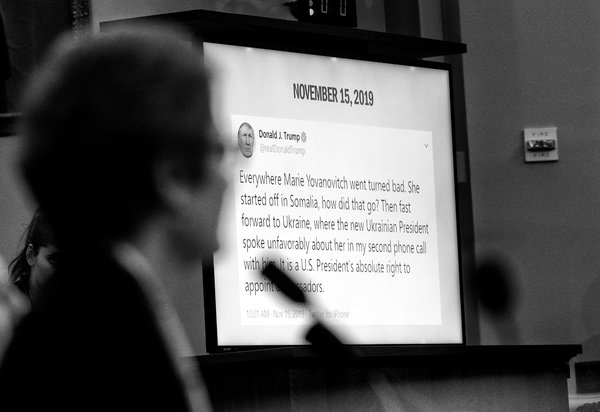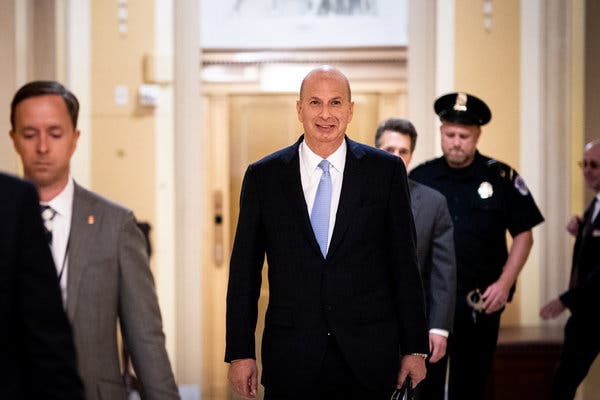What to Watch For in Day 4 of the Trump Impeachment Inquiry Hearings
Gordon D. Sondland, the ambassador to the European Union, arriving last month for an interview with the House committees leading the impeachment investigation.Credit...Erin Schaff
New York Times

By
Peter Baker
November 20, 2019
The House impeachment hearings hit a critical moment on Wednesday with the appearance of perhaps the most significant witness on the public schedule. Gordon D. Sondland, the Trump donor now serving as ambassador to the European Union, will be asked about his role in pressuring Ukraine to open investigations into Democrats and any link to American security aid.
The House impeachment hearings hit a critical moment on Wednesday with the appearance of perhaps the most significant witness on the public schedule.
Gordon D. Sondland, the Trump donor now serving as ambassador to the European Union, will be asked about his role in pressuring Ukraine to open investigations into Democrats and any link to American security aid.
The basics: Who, what, when and how to watch.
Who: Mr. Sondland will appear by himself in the morning session. Laura K. Cooper, a deputy assistant defense secretary, and David Hale, the under secretary of state for political affairs, will testify together in the afternoon session.
What: The House Intelligence Committee, led by its chairman, Representative Adam B. Schiff, Democrat of California, will continue to examine the case for impeaching President Trump. The Republican minority, led by Representative Devin Nunes of California, will again work to poke holes in testimony implicating the president.
When and Where: The morning proceedings start at 9 a.m. Eastern in the vaulted, columned chambers of the House Ways and Means Committee, and could last until the early afternoon. The second set of hearings is scheduled to startu around 2:30 p.m., depending on when the morning session is finished.
How to Watch: The New York Times will stream the testimony live, and a team of reporters in Washington will provide real-time context and analysis of the events on Capitol Hill.
Follow along at nytimes.com, starting a few minutes before 9.
The Impeachment Inquiry’s Main Players
Here are the lawmakers to watch as the process unfolds.
The president’s main agent on Ukraine inside government will be forced to explain inconsistencies in his account.
Mr. Sondland, who told other presidential advisers that Mr. Trump had put him in charge of Ukraine policy, faces a challenging morning as lawmakers will grill him about conflicts between his previous closed-door testimony and versions of events offered by other witnesses.
Mr. Sondland has already been compelled to
amend his testimony once by saying that he now recalled telling a senior Ukrainian official that the release of frozen American security aid probably depended on a public commitment to investigate Democrats, a revision he made only after another Trump administration official told investigators about the conversation.
ADVERTISEMENT
Continue reading the main story
A favor, a phone call and an aid freeze: Sondland will be asked to explain Trump’s role in the pressure campaign.
While Republicans derided many previous witnesses for offering only secondhand accounts, Mr. Sondland was in direct contact with Mr. Trump and will be asked about the president’s instructions to him. Along with Rudolph W. Giuliani, the president’s personal lawyer, Mr. Sondland was at the center of the effort to press Ukraine to turn up damaging information about Democrats.
He will be asked in particular about a telephone conversation he had with Mr. Trump on July 26, the day after the president pressed President Volodymyr Zelensky of Ukraine to
“do us a favor” by investigating Democrats. Mr. Sondland was on the outdoor patio of a restaurant in Kyiv, the Ukrainian capital, and the president spoke loudly enough that the ambassador held the phone away from his ear, allowing others at the table to hear, including an embassy official
who told House investigators about it last Friday.
As Republicans seek to protect Mr. Trump, they may portray Mr. Sondland as acting on his own to link the security aid to the investigations without explicit direction from the president.
Ms. Cooper has said that there was
a consensus within the government that Ukraine was making progress on corruption when the White House abruptly froze the security aid without explanation for a review. Mr. Hale has described pushing unsuccessfully for the State Department to defend
Marie L. Yovanovitch, the ambassador to Ukraine who was targeted by Mr. Giuliani and ultimately removed from her post.
Before then, catch up on some important background on the impeachment inquiry.
- The three witnesses have already appeared for closed-door depositions in the inquiry. Read transcripts or key excerpts from their testimony here: Mr. Sondland, Ms. Cooper, Mr. Hale.
- Mr. Trump repeatedly pressured Mr. Zelensky to investigate people and issues of political concern to Mr. Trump, including the former vice president. Here’s a timeline of events since January.
- A C.I.A. officer who was once detailed to the White House filed a whistle-blower complaint on Mr. Trump’s interactions with Mr. Zelensky. Read the complaint.
Who Are the Main Characters in the Whistle-Blower’s Complaint?
President Trump’s personal lawyer.
The prosecutor general of Ukraine.
Joe Biden’s son.
. . . are just some of the names mentioned in the whistle-blower’s complaint. What were their roles? We break it down.
Congressman: “Sir, let me repeat my question: Did you ever speak to the president about this complaint?”
Congress is investigating allegations that President Trump pushed a foreign government to dig up dirt on his Democratic rivals. “It’s just a Democrat witch hunt.
Here we go again.” At the heart of an impeachment inquiry is a nine-page whistle-blower complaint that names over two dozen people. Not counting the president himself, these are the people that appear the most:
First, Trump’s personal lawyer, Rudolph Giuliani. According to documents and interviews, Giuliani has been involved in shadowy diplomacy on behalf of the president’s interests. He encouraged Ukrainian officials to investigate the Biden family’s activities in the country, plus other avenues that could benefit Trump like whether the Ukrainians intentionally helped the Democrats during the 2016 election. It was an agenda he also pushed on TV. “So you did ask Ukraine to look into Joe Biden.” “Of course I did!”
A person Giuliani worked with, Yuriy Lutsenko, Ukraine’s former prosecutor general. He pushed for investigations that would also benefit Giuliani and Trump. Lutsenko also discussed conspiracy theories about the Bidens in the U.S. media. But he later walked back his allegations, saying there was no evidence of wrongdoing by the Bidens.
This is where Hunter Biden comes in, the former vice president’s son. He served on the board of a Ukrainian energy company run by this guy, who’s had some issues with the law. While Biden was in office, he along with others, called for the dismissal of Lutsenko’s predecessor, a prosecutor named Viktor Shokin, whose office was overseeing investigations into the company that Hunter Biden was involved with. Shokin was later voted out by the Ukrainian government. Lutsenko replaced him, but was widely criticized for corruption himself.
When a new president took office in May, Volodymyr Zelensky, Zelensky said that he’d replace Lutsenko. Giuliani and Trump? Not happy. They viewed Lutsenko as their ally. During a July 25 call between Trump and the new Ukrainian president, Trump defended him, saying, “I heard you had a prosecutor who is very good and he was shut down and that’s really unfair.”
In that phone call, Trump also allegedly asked his counterpart to continue the investigation into Joe Biden, who is his main rival in the 2020 election.
Zelensky has publicly denied feeling pressured by Trump. “In other words, no pressure.”
And then finally, Attorney General William Barr, who also came up in the July 25 call. In the reconstructed transcript, Trump repeatedly suggested that Zelensky’s administration could work with Barr and Giuliani to investigate the Bidens and other matters of political interest to Trump.
Since the whistle-blower complaint was made public, Democrats have criticized Barr for dismissing allegations that Trump had violated campaign finance laws during his call with Zelensky and not passing along the complaint to Congress. House Democrats have now subpoenaed several people mentioned in the complaint, as an impeachment inquiry into the president’s conduct continues.
Peter Baker is the chief White House correspondent and has covered the last four presidents for The Times and The Washington Post. He also is the author of five books, most recently “Impeachment: An American History.”
@peterbakernyt •
Facebook
WRITE A COMMENT
- Common Questions About Impeachment
- How to Keep Up
- Get an email recapping the day’s news
- Download our mobile app on iOS and Android and turn on alerts
- Listen to analysis on our special podcast series, The Latest







